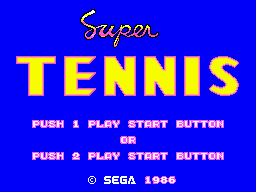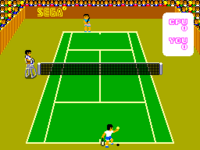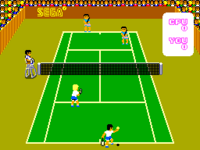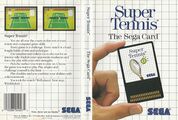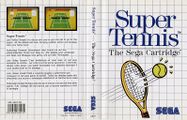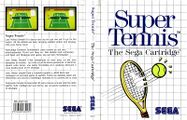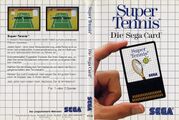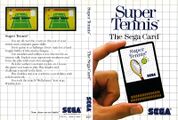Difference between revisions of "Super Tennis"
From Sega Retro
Hyperspeed34 (talk | contribs) |
|||
| (8 intermediate revisions by 3 users not shown) | |||
| Line 2: | Line 2: | ||
{{Bob | {{Bob | ||
| bobscreen=SuperTennis title.png | | bobscreen=SuperTennis title.png | ||
| − | | publisher=[[Sega]] | + | | publisher={{company|[[Sega Enterprises, Ltd.]]|region=JP, EU}}, {{company|[[Sega of America]]|region=US}} |
| − | | developer=[[Sega]] | + | | developer=[[Sega Enterprises, Ltd.]] |
| + | | distributor={{company|[[Ariolasoft]]|region=DE}}, {{company|[[Ecofilmes]]|region=PT}}, {{company|[[Zegetron]]|region=GR}}, {{company|[[Zegetron]]|region=GR}} | ||
| system=[[Sega Master System]] | | system=[[Sega Master System]] | ||
| sounddriver= | | sounddriver= | ||
| Line 29: | Line 30: | ||
| sms_date_pt=19xx | | sms_date_pt=19xx | ||
| sms_code_pt=MSJ-ST | | sms_code_pt=MSJ-ST | ||
| + | | sms_date_bx=19xx | ||
| + | | sms_date_kr=19xx | ||
}} | }} | ||
}} | }} | ||
| − | + | '''''{{PAGENAME}}''''', known as '''''Great Tennis''''' (グレートテニス) in Japan, is a sports game developed and published by Sega for the [[Sega Master System]]. It was released on a [[Sega Card]] internationally, and also on a cartridge in Europe. | |
| + | |||
| + | ==Gameplay== | ||
| + | {{ScreenThumb2|Super Tennis SMS, Singles.png|Super Tennis SMS, Doubles.png|width=200|Singles and doubles}} | ||
| + | The game is a tennis game that can be played by one player against a single computer opponent or by two players in a doubles match against two computer players. On the title screen, one-player games are started by pressing {{1}} on the first control pad, and two-player games are started by pressing {{1}} on the second control pad. There are five difficulty levels for the computer opponents. Players can also choose between three speed levels (A for slowest, C for fastest), three control levels (A for least accurate, C for most accurate), and three player types (A for balanced, B for good offense, and C for good defense). | ||
| + | |||
| + | The game is always played with the human players on the lower end and the computer players on the upper end; players do not switch sides of the court between sets. Singles matches use the inner court boundaries, and doubles matches use the other court boundaries. A match is divided into sets, and the player (or team) to win two out of three sets wins the match. A set is divided into games, and the player to win six games by at least a two-game lead wins the set. If the players tie with six points apiece, play continues until a player wins with a two-game lead. The winner of a game is the player to score four points with at least a two-point lead. If both players score three points, the game continues until one player has made two points consecutively. The first point scored in a game is shown as 15, the second point is shown as 30, and the third point is shown as 40. | ||
| + | |||
| + | Games start with a serve where a player tosses the ball in the air and hits it over the net to the diagonally opposite service box (one of the rectangular areas in the center of the court). The player must stand behind the baseline and can only move on one side of the court (right of the baseline on the first serve, then alternating for each serve after that). Each player (or team) takes turns serving on each game, and the ball is also served after a point is scored or an error is made. Before the ball is tossed, the player moves with {{left}} or {{right}}. The ball is tossed automatically after a short duration, then the player can hit it by pressing {{1}}. If a fault occurs (such as hitting the net or failing to land the ball in the opposite service box), the player serves again. If a double fault occurs, the player serves again and the opponent is awarded a point. | ||
| + | |||
| + | Once the ball is in play, players take turns hitting the ball over the net to each other, with a point earned if the opposing player cannot return the ball. The other player gets a point if the player makes an error (such as hitting the ball out of bounds or letting the ball bounce more than once before returning it). The player can move anywhere behind the net using the D-Pad. There are four types of tennis swings that can be used depending on the position of the player and the ball. When the ball has not yet bounced on the court, the player can return it with a smash (an overhead hit) by pressing {{1}} when the ball is high (typically near the net) or with a volley (a backswing) by pressing {{1}} when the ball is low. After the ball has bounced on the court, the player can return it with a ground stroke (a underhand shot that hits the ball low) by pressing {{1}} or a lob (an underhand shot that hits the ball high into the air) by pressing {{2}}. | ||
==Versions== | ==Versions== | ||
| Line 97: | Line 110: | ||
}}{{Scanbox | }}{{Scanbox | ||
| console=Master System | | console=Master System | ||
| − | | region= | + | | region=BX |
| − | | | + | | cover=SuperTennis BX cover.jpg |
}}{{Scanbox | }}{{Scanbox | ||
| console=Master System | | console=Master System | ||
| − | | region=GR | + | | region=GR |
| cover=SuperTennis GR cover.jpg | | cover=SuperTennis GR cover.jpg | ||
| cart=SuperTennis SMS EU Cart.jpg | | cart=SuperTennis SMS EU Cart.jpg | ||
| manual=Super Tennis SMS EU Manual.pdf | | manual=Super Tennis SMS EU Manual.pdf | ||
| + | }}{{Scanbox | ||
| + | | console=Master System | ||
| + | | region=SE ([[Brio]]) | ||
| + | | manual=SuperTennisSMSSEManual.jpg | ||
}} | }} | ||
{{Scanbox | {{Scanbox | ||
| Line 136: | Line 153: | ||
| cover=SuperTennisSMSAuCoverCard.jpg | | cover=SuperTennisSMSAuCoverCard.jpg | ||
| manual=SuperTennisSMSAUManual.pdf | | manual=SuperTennisSMSAUManual.pdf | ||
| + | }}{{Scanbox | ||
| + | | console=Master System | ||
| + | | region=KR | ||
| + | | cover= | ||
}} | }} | ||
Latest revision as of 02:15, 20 November 2024
- For the game released in Brazil, see Tennis Ace.
| Super Tennis | |||||||||||||||||||||||||||||||||||||||||||||||||||||||||||||||||
|---|---|---|---|---|---|---|---|---|---|---|---|---|---|---|---|---|---|---|---|---|---|---|---|---|---|---|---|---|---|---|---|---|---|---|---|---|---|---|---|---|---|---|---|---|---|---|---|---|---|---|---|---|---|---|---|---|---|---|---|---|---|---|---|---|---|
| System(s): Sega Master System | |||||||||||||||||||||||||||||||||||||||||||||||||||||||||||||||||
| Publisher: Sega Enterprises, Ltd. (JP, EU), Sega of America (US) | |||||||||||||||||||||||||||||||||||||||||||||||||||||||||||||||||
| Developer: Sega Enterprises, Ltd. | |||||||||||||||||||||||||||||||||||||||||||||||||||||||||||||||||
| Distributor: Ariolasoft (DE), Ecofilmes (PT), Zegetron (GR), Zegetron (GR) | |||||||||||||||||||||||||||||||||||||||||||||||||||||||||||||||||
| Genre: Sports[1] (tennis) | |||||||||||||||||||||||||||||||||||||||||||||||||||||||||||||||||
| Number of players: 1-2 | |||||||||||||||||||||||||||||||||||||||||||||||||||||||||||||||||
|
Super Tennis, known as Great Tennis (グレートテニス) in Japan, is a sports game developed and published by Sega for the Sega Master System. It was released on a Sega Card internationally, and also on a cartridge in Europe.
Contents
Gameplay
The game is a tennis game that can be played by one player against a single computer opponent or by two players in a doubles match against two computer players. On the title screen, one-player games are started by pressing ![]() on the first control pad, and two-player games are started by pressing
on the first control pad, and two-player games are started by pressing ![]() on the second control pad. There are five difficulty levels for the computer opponents. Players can also choose between three speed levels (A for slowest, C for fastest), three control levels (A for least accurate, C for most accurate), and three player types (A for balanced, B for good offense, and C for good defense).
on the second control pad. There are five difficulty levels for the computer opponents. Players can also choose between three speed levels (A for slowest, C for fastest), three control levels (A for least accurate, C for most accurate), and three player types (A for balanced, B for good offense, and C for good defense).
The game is always played with the human players on the lower end and the computer players on the upper end; players do not switch sides of the court between sets. Singles matches use the inner court boundaries, and doubles matches use the other court boundaries. A match is divided into sets, and the player (or team) to win two out of three sets wins the match. A set is divided into games, and the player to win six games by at least a two-game lead wins the set. If the players tie with six points apiece, play continues until a player wins with a two-game lead. The winner of a game is the player to score four points with at least a two-point lead. If both players score three points, the game continues until one player has made two points consecutively. The first point scored in a game is shown as 15, the second point is shown as 30, and the third point is shown as 40.
Games start with a serve where a player tosses the ball in the air and hits it over the net to the diagonally opposite service box (one of the rectangular areas in the center of the court). The player must stand behind the baseline and can only move on one side of the court (right of the baseline on the first serve, then alternating for each serve after that). Each player (or team) takes turns serving on each game, and the ball is also served after a point is scored or an error is made. Before the ball is tossed, the player moves with ![]() or
or ![]() . The ball is tossed automatically after a short duration, then the player can hit it by pressing
. The ball is tossed automatically after a short duration, then the player can hit it by pressing ![]() . If a fault occurs (such as hitting the net or failing to land the ball in the opposite service box), the player serves again. If a double fault occurs, the player serves again and the opponent is awarded a point.
. If a fault occurs (such as hitting the net or failing to land the ball in the opposite service box), the player serves again. If a double fault occurs, the player serves again and the opponent is awarded a point.
Once the ball is in play, players take turns hitting the ball over the net to each other, with a point earned if the opposing player cannot return the ball. The other player gets a point if the player makes an error (such as hitting the ball out of bounds or letting the ball bounce more than once before returning it). The player can move anywhere behind the net using the D-Pad. There are four types of tennis swings that can be used depending on the position of the player and the ball. When the ball has not yet bounced on the court, the player can return it with a smash (an overhead hit) by pressing ![]() when the ball is high (typically near the net) or with a volley (a backswing) by pressing
when the ball is high (typically near the net) or with a volley (a backswing) by pressing ![]() when the ball is low. After the ball has bounced on the court, the player can return it with a ground stroke (a underhand shot that hits the ball low) by pressing
when the ball is low. After the ball has bounced on the court, the player can return it with a ground stroke (a underhand shot that hits the ball low) by pressing ![]() or a lob (an underhand shot that hits the ball high into the air) by pressing
or a lob (an underhand shot that hits the ball high into the air) by pressing ![]() .
.
Versions
Localised names
| Language | Localised Name | English Translation |
|---|---|---|
| English | Super Tennis | Super Tennis |
| English (US) | Super Tennis | Super Tennis |
| Japanese | グレートテニス | Great Tennis |
Magazine articles
- Main article: Super Tennis/Magazine articles.
Promotional material
Physical scans
| Sega Retro Average | ||||||||||||||||||||||||||||||||||||||||||||||||||||||||||||||||
|---|---|---|---|---|---|---|---|---|---|---|---|---|---|---|---|---|---|---|---|---|---|---|---|---|---|---|---|---|---|---|---|---|---|---|---|---|---|---|---|---|---|---|---|---|---|---|---|---|---|---|---|---|---|---|---|---|---|---|---|---|---|---|---|---|
|
| 47 | |
|---|---|
| Based on 12 reviews | |
| Master System, BX† |
|---|
| Master System, SE (Brio) |
|---|
|
| Master System, KR |
|---|
|
Technical information
ROM dump status
| System | Hash | Size | Build Date | Source | Comments | |||||||||
|---|---|---|---|---|---|---|---|---|---|---|---|---|---|---|
| ? |
|
32kB | Cartridge (EU/US) | |||||||||||
| ? |
|
32kB | Cartridge (JP) |
References
- ↑ 1.0 1.1 https://sega.jp/history/hard/segamark3/software.html (Wayback Machine: 2020-11-14 21:32)
- ↑ Computer Entertainer, "January 1987" (US; 1987-01-xx), page 14
- ↑ File:SMSGameCatalog1EU.pdf, page 3
- ↑ 4.0 4.1 Computer & Video Games, "November 1987" (UK; 1987-10-15), page 132
- ↑ ACE, "January 1989" (UK; 1989-xx-xx), page 167
- ↑ The Mastertronic Catalogue (UK; 1988), page 2
- ↑ Complete Guide to Consoles, "Volume IV" (UK; 1990-11-xx), page 108
- ↑ The Complete Guide to Sega, "" (UK; 1991-05-xx), page 64
- ↑ Console XS, "June/July 1992" (UK; 1992-04-23), page 146
- ↑ Game Power, "Dicembre 1991" (IT; 1991-1x-xx), page 42
- ↑ Mean Machines Sega, "October 1992" (UK; 1992-09-xx), page 136
- ↑ Power Up!, "Saturday, June 20, 1992" (UK; 1992-06-20), page 1
- ↑ S: The Sega Magazine, "July 1990" (UK; 1990-06-07), page 8
- ↑ Sega Power, "October 1991" (UK; 1991-09-05), page 60
- ↑ Sega Pro, "April 1992" (UK; 1992-03-19), page 30
- ↑ Sega Pro, "April 1993" (UK; 1993-03-11), page 72
- ↑ Software Gids, "Nov./Dec. 1990" (NL; 1990-11-xx), page 40
- ↑ Tilt, "Décembre 1987" (FR; 1987-1x-xx), page 102
| Super Tennis | |
|---|---|
|
Main page | Comparisons | Development | Magazine articles | Reception | |
| Games in the Great sports series |
|---|
| Soccer (1985) | Baseball (1985) | Tennis (1985) | Golf (1986) | Ice Hockey (1986) | Baseball (1987) | Basketball (1987) | Volleyball (1987) | Football (1987) | Golf (1987) |
- 1-2 player games
- JP Master System games
- All JP games
- US Master System games
- All US games
- EU Master System games
- All EU games
- BX Master System games
- All BX games
- DE Master System games
- All DE games
- PT Master System games
- All PT games
- UK Master System games
- All UK games
- SE Master System games
- All SE games
- GR Master System games
- All GR games
- AU Master System games
- All AU games
- KR Master System games
- All KR games
- Master System games
- 1985 Master System games
- All 1985 games
- Master System tennis games
- Master System sports games
- All sports games
- All games
- Old technical information
- Super Tennis
- Great sports
